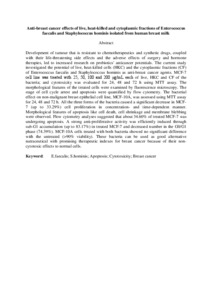Citation
Hassan, Zubaida and Mustafa, Shuhaimi and Abdul Rahim, Raha and Mat Isa, Nurulfiza
(2016)
Anti-breast cancer effects of live, heat-killed and cytoplasmic fractions of Enterococcus faecalis and Stuphylococcus hominis isolated from human breast milk.
In Vitro Cellular & Developmental Biology - Animal, 52.
pp. 337-348.
ISSN 1071-2690; ESSN: 1543-706X
Abstract
Development of tumour that is resistant to chemotherapeutics and synthetic drugs, coupled with their life-threatening side effects and the adverse effects of surgery and hormone therapies, led to increased research on probiotics' anticancer potentials. The current study investigated the potential of live, heat-killed cells (HKC) and the cytoplasmic fractions (CF) of Enterococcus faecalis and Staphylococcus hominis as anti-breast cancer agents. MCF-7 cell line was treated with 25, 50, 100 and 200 μg/mL each of live, HKC and CF of the bacteria; and cytotoxicity was evaluated for 24, 48 and 72 h using MTT assay. The morphological features of the treated cells were examined by fluorescence microscopy. The stage of cell cycle arrest and apoptosis were quantified by flow cytometry. The bacterial effect on non-malignant breast epithelial cell line, MCF-10A, was assessed using MTT assay for 24, 48 and 72 h. All the three forms of the bacteria caused a significant decrease in MCF-7 (up to 33.29%) cell proliferation in concentration- and time-dependent manner. Morphological features of apoptosis like cell death, cell shrinkage and membrane blebbing were observed. Flow cytometry analyses suggested that about 34.60% of treated MCF-7 was undergoing apoptosis. A strong anti-proliferative activity was efficiently induced through sub-G1 accumulation (up to 83.17%) in treated MCF-7 and decreased number in the G0/G1 phase (74.39%). MCF-10A cells treated with both bacteria showed no significant difference with the untreated (>90% viability). These bacteria can be used as good alternative nutraceutical with promising therapeutic indexes for breast cancer because of their non-cytotoxic effects to normal cells.
Download File
![[img]](http://psasir.upm.edu.my/43787/1.hassmallThumbnailVersion/Anti-breast%20cancer%20effects%20of%20live%2C%20heat-killed%20and%20cytoplasmic%20fractions%20of%20Enterococcus%20.pdf)  Preview |
|
Text (Abstract)
Anti-breast cancer effects of live, heat-killed and cytoplasmic fractions of Enterococcus .pdf
Download (107kB)
| Preview
|
|
Additional Metadata
Actions (login required)
 |
View Item |

